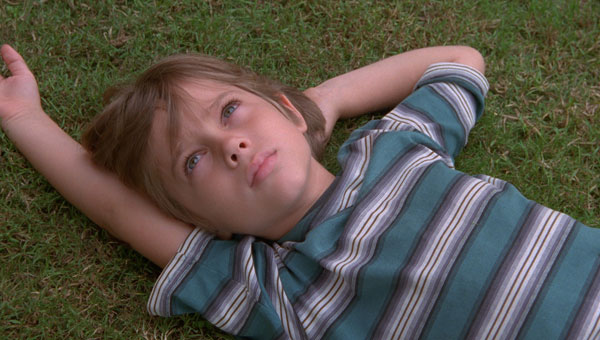Boyhood Review

As the old saying goes, they grow up so fast.
And that certainly is the case in Richard Linklater’s latest film, Boyhood, which squeezes some twelve years of both characters and actors’ lives into a hundred and sixty five minutes of running time.
The project famously started out as a short film in the summer 2002, to which Linklater planned to add by shooting another short film each year with the same cast. And, more importantly, playing the same roles.
Think of it as a more intense version of Linklater’s Before Sunrise trilogy, which merely takes three snapshots of a couple’s relationship every ten years or so.
The story focuses on Mason (Ellar Coltrane) and his family: hard-working mum Olivia (Patricia Arquette), occasional dad Mason Senior (Ethan Hawke) and sister Sam (Linklater’s own daughter Lorelei).
We then follow Mason’s life from elementary school, through his Dazed and Confused high school years, up to his college freshman days. Throughout this period, the film examines not only the changes in Mason himself, but also the changes in his relationships with those around him.
It’s an intriguing concept, and one that has been attempted before but never within the confines of a single film. The question is, does it work?
The short answer is, yes.
The long answer warrants a brief caution over some of the film’s side effects.
The jumps in time can be a little jarring at first. But as time passes, these transitions are more clearly signposted by the cast’s growth spurts and by Mason’s increasingly silly hairdos.
Also, the film is quite long for what it is. Evidently a two hour plus running time is acceptable for hobbits, jedi’s and James Bond, but for a dramatic piece that lacks a conventional beginning, middle and end, two and three quarter hours is quite a slog.
This is not a criticism by any means, merely advice: be prepared to put the time in and you shall be rewarded.
Once you have accepted these quirks, the film has a lot to offer.
The main performances are all solid, and more than compensate for the admittedly stilted moments from some supporting players along the way. There is a fine line between naturalistic acting and non-acting, and the film only crosses this line a handful of times.
Arquette and Hawke are in superb form as Mason’s separated parents, even if the latter does arguably play a version of himself. In other words, an intelligent, articulate and opinionated left-winger.
Coltrane impresses in the main role, considering he originally won the part when he was about seven years old. He offers quite a subtle rendition of teenage apathy, which grows into a freshman’s burgeoning frustration that the world is not what they expected.
The film’s shifts in tone are fortunately not as sudden as the temporal ones, with light comedic and sentimental moments woven in with the harsh and darker moments. Like life really. And no mean feat for a story which took twelve years to film.
The end result is a rich, layered piece which washes over you and ends on a bittersweet yet hopeful note about how fast time passes, but only if we fail to live in the moment.
Conor Brennan
Very good analysis of “Boyhood”